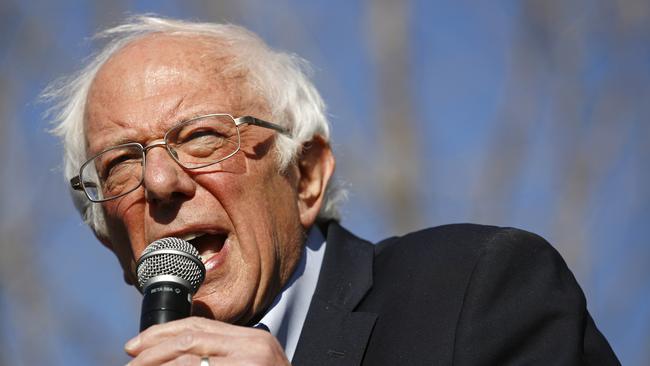Ways and means of wealthiest presidential contenders

The billionaire Bloomberg and millionaire Sanders are sure to be throwing rhetorical punches at each other at Thursday’s (AEDT) Democratic presidential debate in Las Vegas. And beyond their financial success, both men have reason to be encouraged by recent polling results.
According to a new Wall Street Journal/NBC News poll, the Vermont senator has taken the lead in the primary race, with four candidates essentially tied for second place amid declining support for former vice-president Joe Biden and the rising profile of Bloomberg, a former New York mayor.
Sanders had 27 per cent support among Democratic primary voters nationally in the new survey, the same as last month. Bloomberg is bunched closely with Biden and senator Elizabeth Warren, who each have 14 per cent support, and former mayor Pete Buttigieg, with 13 per cent.
Sanders is leading a bipartisan coalition opposed to the new political competition represented by Bloomberg. Sanders is accusing the entrepreneur of trying to buy the election. Bloomberg has spent close to $US400m ($598m) of his vast fortune advertising his candidacy and has also donated to politically influential groups far and wide.
President Donald Trump seems to agree with Sanders, tweeting: “What Mini Mike is doing is nothing less than a large scale illegal campaign contribution. He is ‘spreading’ money all over the place, only to have recipients of his cash payments, many former opponents, happily joining or supporting his campaign. Isn’t that called a payoff?
“Mini is illegally buying the Democrat Nomination. They are taking it away from Bernie again. Mini Mike, Major Party Nominations are not for sale! Good luck in the debate tomorrow night and remember, no standing on boxes!”
And Warren tweeted: “It’s a shame Mike Bloomberg can buy his way into the debate. But at least now primary voters curious about how each candidate will take on Donald Trump can get a live demonstration of how we each take on an egomaniac billionaire.”
Of course there was no shortage of egomaniacs in the field even before Bloomberg’s arrival. And while Warren and Sanders are millionaires they sure don’t have anything close to Bloomberg’s money.
According to Forbes magazine, Bloomberg is worth $US64bn. It’s not hard to understand why he created and marketed an information service that is highly valued by financial professionals around the world.
Bloomberg doesn’t appear in his company’s Billionaires Index because, according to the firm: “Bloomberg News editorial policy is to not cover Bloomberg LP. As a result, Michael Bloomberg, the founder and majority owner of Bloomberg LP, isn’t considered for this ranking.”
Few people seem to quarrel with the idea that his privately held company is worth tens of billions of dollars. But what about the finances of Bloomberg’s chief rival for the Democratic nomination?
Chase Peterson-Withorn wrote last year in Forbes magazine about Sanders’s finances: “Sanders … has, in fact, amassed an estimated $US2.5m fortune from real estate, investments, government pensions — and earnings from three books, including the 2016 hit Our Revolution: A Future to Believe In.”
By way of comparison, according to the most recent Federal Reserve Survey of Consumer Finances, in 2016 the median net worth of American families was $US97,300.
The Sanders business model seems to limit the risk of a publishing dud. In his new book, Profiles in Corruption, Peter Schweizer reports that Sanders’s Senate and presidential campaign organisations have spent more than $US500,000 buying copies of his books. The page-turners are given to campaign donors.
This column should emphasise that the Forbes estimate of the Sanders net worth could be low. There is special cause for scepticism here because Sanders has not exactly been a fanatic about reporting the details of his finances.
Dave Levinthal of the Centre for Public Integrity noted in August 2016 that Sanders had managed to “beat the clock” and avoid sharing information normally required of presidential candidates. Levinthal reported that in May 2016 Sanders requested and subsequently received a 45-day extension from the Federal Election Commission to disclose details of his personal finances. On June 30, his campaign requested a second 45-day extension, which regulators again approved.
Now the second extension has expired, Sanders spokesman Michael Briggs confirmed to the Centre for Public Integrity that the senator won’t file a presidential campaign personal financial disclosure after all. “We were told that since the senator no longer is a candidate there was no requirement to file,” Briggs said.
FEC spokesman Christian Hilland verified that Sanders has not filed a personal financial disclosure. He also confirmed that Sanders, who technically ceased to be a presidential candidate when Hillary Clinton secured the Democratic nomination on July 26, is no longer required to file one.
Maybe Bloomberg News can start a Millionaires Index and take a guess.
The Wall Street Journal



Michael Bloomberg is a lot wealthier than Bernie Sanders. But there’s a case to be made that Sanders has been more creative in developing his business model. Who would have guessed that being a full-time socialist in the US could result in a net worth more than 25 times that of the median American household?